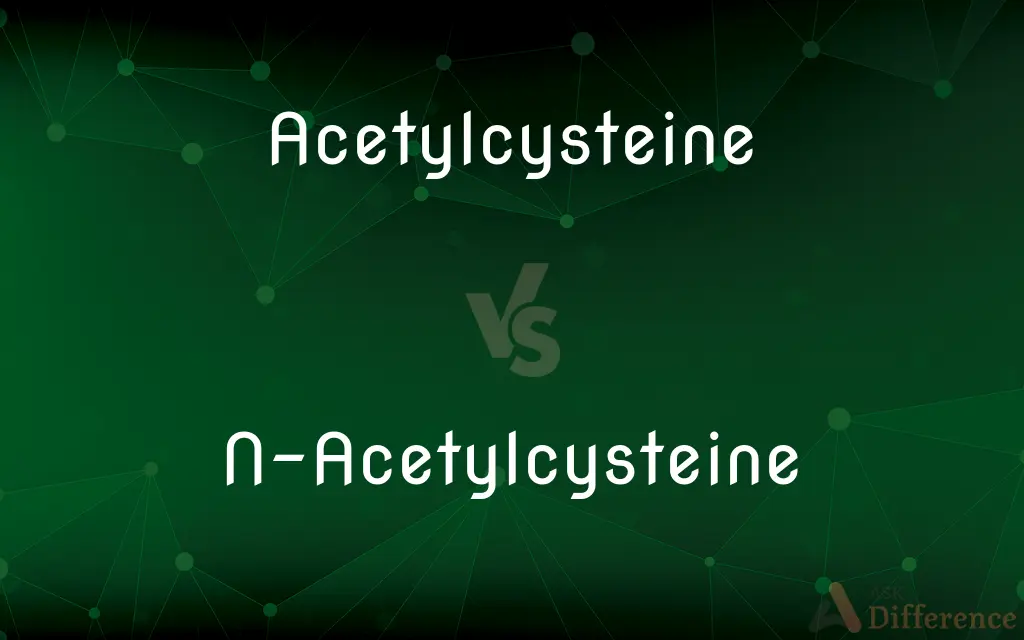Acetylcysteine vs. N-Acetylcysteine — What's the Difference?
By Tayyaba Rehman — Published on January 7, 2024
Acetylcysteine and N-Acetylcysteine refer to the same chemical compound, a derivative of the amino acid cysteine, used primarily for medical purposes.

Difference Between Acetylcysteine and N-Acetylcysteine
Table of Contents
ADVERTISEMENT
Key Differences
Acetylcysteine, also known as N-Acetylcysteine or NAC, is essentially the same compound. It is a pharmaceutical drug and a supplement derived from the amino acid cysteine. The terms "Acetylcysteine" and "N-Acetylcysteine" are often used interchangeably in both medical and scientific communities.
This compound is known for its role in replenishing glutathione levels, a vital antioxidant in the human body, and for breaking down mucus. It is commonly used in conditions like acetaminophen (paracetamol) overdose, chronic obstructive pulmonary disease (COPD), and cystic fibrosis.
Acetylcysteine works as a mucolytic agent, meaning it helps in thinning and loosening mucus in the airways, making it easier to breathe in respiratory conditions. As N-Acetylcysteine, it is often used in the same context, with its efficacy in antioxidant protection and as a detoxification agent.
In medical settings, Acetylcysteine can be administered orally, intravenously, or as an inhalant. The use of N-Acetylcysteine follows similar administration routes, depending on the condition being treated.
Both forms of the compound are recognized for their potential in psychiatric and neurological conditions, due to their effects on neurotransmitters and neuroprotective properties. Whether referred to as Acetylcysteine or N-Acetylcysteine, the substance's medical and pharmacological properties remain consistent.
ADVERTISEMENT
Comparison Chart
Chemical Composition
Derivative of the amino acid cysteine.
Same as Acetylcysteine.
Primary Use
Mucolytic agent, antioxidant replenishment.
Identical to Acetylcysteine.
Medical Applications
Used in respiratory conditions, acetaminophen overdose.
Same applications as Acetylcysteine.
Administration
Oral, intravenous, inhalation.
Same as Acetylcysteine.
Neurological Benefits
Potential benefits in psychiatric/neurological conditions.
Same as Acetylcysteine.
Compare with Definitions
Acetylcysteine
Acetylcysteine is a derivative of cysteine used as a mucolytic agent.
Acetylcysteine was prescribed to help clear his bronchial passages.
N-Acetylcysteine
It acts as a mucolytic and replenishes antioxidants.
N-Acetylcysteine assists in detoxifying the liver after toxin exposure.
Acetylcysteine
Used in respiratory conditions for its mucus-thinning properties.
For patients with COPD, acetylcysteine can improve breathing.
N-Acetylcysteine
Explored for its potential in treating psychiatric disorders.
N-Acetylcysteine is being studied for its effects on mood disorders.
Acetylcysteine
Administered in various forms, including oral and inhalation.
She received acetylcysteine through an inhaler.
N-Acetylcysteine
Can be taken orally or administered via inhalation.
The doctor prescribed N-Acetylcysteine in a pill form.
Acetylcysteine
Acetylcysteine has applications in neurological conditions.
Recent studies show acetylcysteine might benefit those with neurodegenerative diseases.
N-Acetylcysteine
N-Acetylcysteine is a pharmaceutical drug derived from the amino acid cysteine.
N-Acetylcysteine is commonly used in hospitals for certain lung conditions.
Acetylcysteine
It helps replenish glutathione, an important antioxidant.
Acetylcysteine is effective in treating acetaminophen overdose due to its antioxidant properties.
N-Acetylcysteine
Effective in treating respiratory diseases and overdoses.
N-Acetylcysteine was given to counteract an overdose.
Acetylcysteine
An acetylated form of the amino acid cysteine (trademark Mucomyst), which is an antioxidant used as a mucolytic agent and in the treatment of paracetamol poisoning.
Common Curiosities
What are the benefits of N-Acetylcysteine in neurology?
It's being explored for its neuroprotective properties and potential benefits in psychiatric disorders.
Can N-Acetylcysteine be used for respiratory conditions?
Yes, it's effective in treating respiratory conditions by thinning mucus.
How is Acetylcysteine administered in medical settings?
It can be given orally, intravenously, or through inhalation.
Is Acetylcysteine effective in treating acetaminophen overdose?
Yes, it's a crucial treatment for acetaminophen overdose.
Can N-Acetylcysteine be taken as a supplement?
Yes, it is available as a dietary supplement.
Is N-Acetylcysteine available over the counter?
It's available over the counter as a supplement and under prescription for medical uses.
What are the advantages of using N-Acetylcysteine in psychiatry?
It may have benefits in mood regulation and reducing oxidative stress.
What are the side effects of Acetylcysteine?
Side effects can include nausea, vomiting, and allergic reactions, among others.
Can N-Acetylcysteine help with COPD?
Yes, it's used to manage symptoms of COPD by acting as a mucolytic.
Are Acetylcysteine and N-Acetylcysteine the same?
Yes, they refer to the same chemical compound.
What are the primary uses of Acetylcysteine?
Its main uses are as a mucolytic agent and for replenishing antioxidants in the body.
How does Acetylcysteine work as an antioxidant?
It replenishes glutathione levels, a vital antioxidant in the body.
Can Acetylcysteine be used in children?
Yes, but under medical supervision and in appropriate dosages.
Is N-Acetylcysteine safe for long-term use?
Long-term use should be under medical advice, as there can be potential side effects.
Is inhalation the only way to administer Acetylcysteine?
No, it can also be administered orally or intravenously.
Share Your Discovery

Previous Comparison
Monocotyledons vs. Dicotyledons
Next Comparison
Demand Deposit vs. Term DepositAuthor Spotlight
Written by
Tayyaba RehmanTayyaba Rehman is a distinguished writer, currently serving as a primary contributor to askdifference.com. As a researcher in semantics and etymology, Tayyaba's passion for the complexity of languages and their distinctions has found a perfect home on the platform. Tayyaba delves into the intricacies of language, distinguishing between commonly confused words and phrases, thereby providing clarity for readers worldwide.












































